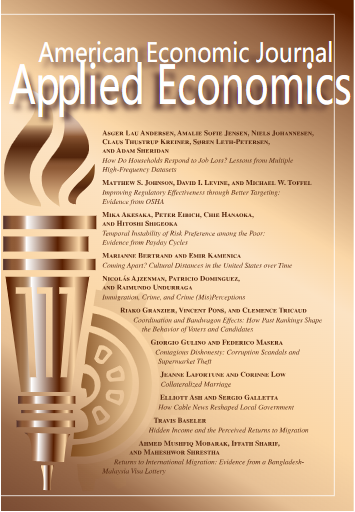穷人风险偏好的时间不稳定性:来自发薪日周期的证据
IF 6.2
1区 经济学
Q1 ECONOMICS
引用次数: 0
摘要
穷人靠薪水生活,经常受到强烈的周期性收入波动的影响。我们调查这种收入波动是否会影响他们的风险偏好。如果风险偏好在发薪日前后暂时发生变化,发薪日之前做出的最佳决策可能在发薪日之后不再是最佳决策,这可能会加剧贫困。通过对美国社会保障发薪日周期的研究,我们发现严重依赖社会保障的穷人在发薪日之前变得更能承受风险。除了发薪前的认知能力下降之外,心理健康状况的恶化和相对匮乏可能也起着重要作用。我们在日本老年人中发现了类似的证据。(jl d81, d91, g51, i12, i32, j14, j31)本文章由计算机程序翻译,如有差异,请以英文原文为准。
Temporal Instability of Risk Preference among the Poor: Evidence from Payday Cycles
The poor live paycheck to paycheck and are repeatedly exposed to strong cyclical income fluctuations. We investigate whether such income fluctuations affect their risk preference. If risk preference temporarily changes around payday, optimal decisions made before payday may no longer be optimal afterward, which could reinforce poverty. By exploiting social security payday cycles in the United States, we find that the poor relying heavily on social security become more risk tolerant before payday. More than cognitive decline before payday, the deterioration of mental health and relative deprivation are likely to play a role. We find similar evidence among the Japanese elderly. (JEL D81, D91, G51, I12, I32, J14, J31)
求助全文
通过发布文献求助,成功后即可免费获取论文全文。
去求助
来源期刊

American Economic Journal-Applied Economics
ECONOMICS-
CiteScore
9.10
自引率
1.60%
发文量
63
期刊介绍:
American Economic Journal: Applied Economics publishes papers covering a range of topics in applied economics, with a focus on empirical microeconomic issues. In particular, we welcome papers on labor economics, development microeconomics, health, education, demography, empirical corporate finance, empirical studies of trade, and empirical behavioral economics.
 求助内容:
求助内容: 应助结果提醒方式:
应助结果提醒方式:


